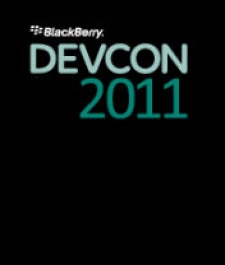It's no surprise that thanks to a historic focus on enterprise and their typically landscape oriented screens, BlackBerry devices have not been good for gaming.
But with games being the largest single activity on smartphones and tablets, it's an area RIM knows it will have to get much more serious about if it hopes to regain market share lost to iOS and Android.
And that brings us to Anders Jeppsson, the somewhat unlikely figure who finds himself as RIM's first head of games, although his business card technically says senior manager, strategic business development.
Finger on the pulse
It's not his experience that makes him a somewhat unlikely figure though.
Previously, CEO of Swedish console and mobile developer SouthEnd Interactive for over a decade, he joined Swedish user experience outfit The Astonishing Tribe just around the time it was acquired by RIM in December 2010.
"Initially, I wasn't very happy because it meant the job I was going to do, didn't exist any more," Jeppsson recalls.
In addition, BlackBerry is a tiny brand in Sweden, with only corporates using the handsets; iOS being the dominant platform.
Yet, Jeppsson has proved to be the right man at the right time for RIM. Negotiations ensued at the end of 2010 with Jeppsson putting together a strategy document, providing a coherent plan for gaming.
"I realised it would be a compelling proposition. Its going to be a fascinating 12 to 24 months."
The way ahead
The results have been clear, ranging from the acquisition of social gaming network Scoreloop in June, to RIM becoming much more active in terms of talking to middleware companies, game publishers and developers.
"The company has really flipped the coin in terms of its focus on gaming," Jeppsson explains.
"Now we need to show BlackBerry has a healthy ecosystem for gaming, to demonstrate that developers can make money on the platform."
He particularly points to much that can be done in terms of monetisation and discovery.
The first element of this has been seen with the PlayBook tablet, which has been the focus of much of the discussion at the Blackberry Developers Conference.
Yet, the key challenge for the company - as well as Jeppsson himself - will be BlackBerry's future smartphones.
Pocket-sized and social
"We'll always have more fragmentation than iOS, but compared to Android, we'll certainly be on the pleasant side," he confesses, referring to the various form factors RIM supports for its phones.
Focusing on the opportunities, Jeppsson is keen to point to areas in which BlackBerry has always been strong.
"BBM is a cornerstone of the company that will combine well with Scoreloop," he states. "This is great differentiation for us."
Even issues such as the availability of a hard keyboards could have positive implications, with Jeppsson pointing to the popularity of word games such as Words With Friends.
"These type of experiences are blurring the line between games and social mechanics," he reckons.
New horizons
Personally not a fan of Ville-style social games, Jeppsson is also looking to mobile developers to be more innovative in their future approaches.
One example of future sociability he floats is the ability to share game states between people, something he called the serialisation of gaming content and context.
"Imagine being able to pass over a boss mission that you're stuck on to your friend to complete," he predicts, referring to the flow of experience that's been an underlying thread throughout much of RIM's corporate communication at the show.
"We have a vision of a federation of devices, sharing data and content in future. As people have multiple devices, we're looking to that seamless transition between machines."
Legwork
Yet, for the time being, his focus is just to get more developers making their games for BlackBerry devices.
"Porting is a hassle for studios - it's extra bandwidth for them - so that's something that we're working on," Jeppsson explains.
As well as gaining strong support from middleware platforms such as Unity and Marmalade, he's also been working with old colleagues such as Swedish mobile publisher Polarbit. It's ported its internal engine to support BlackBerry, in the process bringing 13 existing titles to the platform.
"It's about a longterm play," he says. "I don't feel the need to go out and acquire exclusive content. It's all about creating a healthy ecosystem for developers."
BB DevCon 11: Anders Jeppsson, RIM's first head of games, on the opportunities and challenges with BlackBerry
#bbdevcon We need to create a healthy ecosystem
























